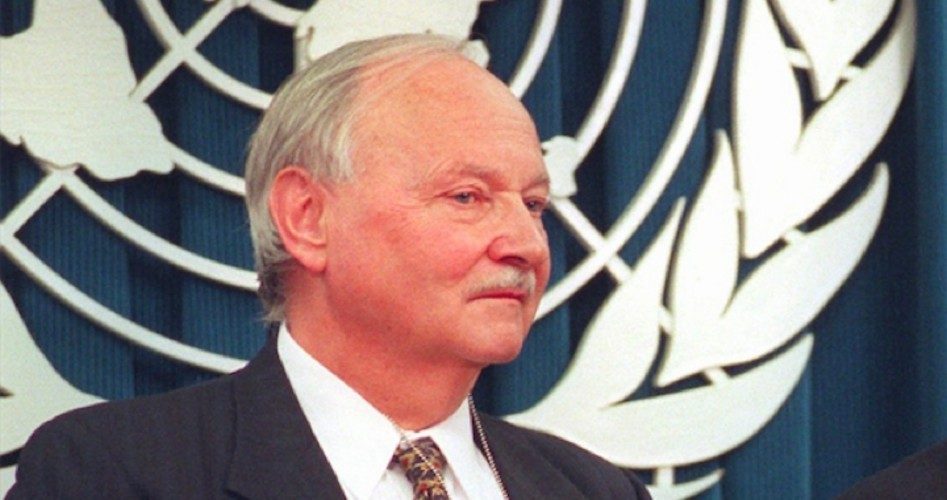
Maurice Strong (shown), the highly influential voice and force behind the global environmental agenda, passed away on November 27, just three days before the start of one of his ideological children: the United Nations Climate Change Conference (COP21) in Paris. That summit is of course a major milestone in the UN’s long road to building a global green regime that can be traced back to the 1992 Earth Summit in Rio de Janeiro that Strong headed. And it can be traced back even further to the first UN environmental conference in 1972 in Stockholm that was also headed by Strong.
Born in 1929, Strong was a child of the Great Depression, which, he said, turned him into “a socialist in ideology, a capitalist in methodology.” Following World War II he clerked at the United Nations and befriended David Rockefeller, who helped his career both at the UN and in the Canadian oil industry. In 1970, following his rise to the presidency of the Power Corporation of Canada, he returned to New York to become the secretary general of the UN’s Conference on the Human Environment and then the first executive director of the United Nations Environment Program (UNEP). In 1971 he commissioned a report on the state of the planet, Only One Earth, which prepared the way for him to head up the Stockholm Conference the following year.
Twenty years later he led the United Nations Conference on Environment and Development (UNCED), more commonly known as the Earth Summit, in Rio de Janeiro. He considered the Earth Summit a failure in that the conferees agreed to fund less than five percent of the $125 billion he wanted to begin with to solve the “problem” of global warming. But it began the Agenda 21 program and laid the groundwork for the Kyoto Protocol, which was adopted five years later by 192 countries. That placed an obligation on the signees to begin to reduce greenhouse gases based on the controversial idea that they are responsible for the alleged warming of the earth.
In his activist life, Strong co-chaired the Earth Charter Commission, whose charter called for “global interdependence” to solve the global warming problem. The idea emanated from Strong and Mikhail Gorbachev, the former Soviet Union’s general secretary of the Communist Party, who at the time were both members of the Club of Rome. Founded in 1968, the Club of Rome burst into popular consciousness with its 1972 report, The Limits to Growth, a neo-Malthusian tract that used computer models to posit that exponential population growth would soon outstrip finite natural resources, leading to calamitous global consequences. Along with Rachel Carson’s Silent Spring (1962) and Paul Ehrlich’s The Population Bomb (1968), The Limits to Growth can be counted as one of the seminal doom-and-gloom reports that helped launch the militant environmental movement. In its 1991 report, The First Global Revolution, the Club further revealed its disturbing world view:
The common enemy of humanity is man. In searching for a new enemy to unite us, we came up with the idea that pollution, the threat of global warming, water shortages, famine and the like, would fit the bill…. All these dangers are caused by human intervention, and it is only through changed attitudes and behavior that they can be overcome. The real enemy, then, is humanity itself.
Following his stint at the Earth Charter Commission, Strong chaired the World Resources Institute, and served on the board of the International Institute for Sustainable Development and the Stockholm Environment Institute, among others. Each of these expressed in one form or another Strong’s socialist ideology and worldview. And so did the UNEP. During Strong’s reign there, the UNEP issued a report stating:
Private land ownership is a principal instrument of accumulating wealth and therefore contributes to social injustice. Public control of land use is therefore indispensable….
Public ownership of land is justified in favor of the common good, rather than to protect the interest of the already privileged.
In 1991, Strong wrote in a UNCED (pre-Earth Summit) report:
It is clear that current lifestyles and consumption patterns of the affluent middle-class … involving high meat intake, consumption of large amounts of frozen and “convenience” foods, ownership of motor vehicles, numerous electrical appliances, home and workplace air-conditioning … expensive suburban housing … are not sustainable.
He continued: “A shift is necessary towards lifestyles … less geared to … environmentally damaging consumption patterns.”
In a nutshell, Strong viewed middle-class living as unsustainable. And he envisioned a global green planetary regime to impose his idea of what is “sustainable” on all of humanity. At the 1992 Earth Summit he stated:
It is simply not feasible for sovereignty to be exercised unilaterally by individual nation-states, however powerful. It is a principal which will yield only slowly and reluctantly to the imperatives of global environmental cooperation.
By “global environmental cooperation” Strong means world government. In a recent National Post article, Peter Foster quoted Strong lamenting, “The single greatest weakness of the existing international legal regime is the almost total lack of capacity for enforcement.”
Maurice Strong is now gone. But the threat to our liberties posed by his legacy — as exhibted just last week by the “climate” agreement that came out of the Paris Summit — is still very much alive.
Photo of Maurice Strong: AP Images
A graduate of an Ivy League school and a former investment advisor, Bob is a regular contributor to The New American magazine and blogs frequently at LightFromTheRight.com, primarily on economics and politics. He can be reached at [email protected].
Related articles and videos:
The Global Green Regime (The earliest effort to expose Maurice Strong, in 1992)
In Paris, UN Approves Draconian Global “Climate” Regime
In Paris, Scientists Debunk UN “Climate” Hysteria
Dictators Demand Trillions in “Climate” Loot From West
At UN Summit, Obama Blames America for Global Warming
Communist Chinese Agent Intimidates TNA Reporters at UN Summit



